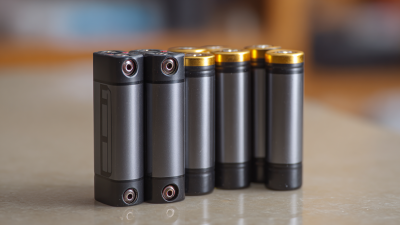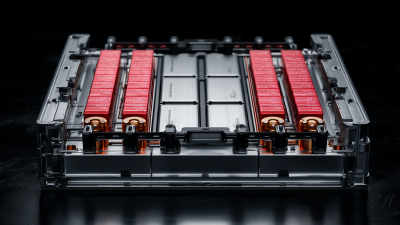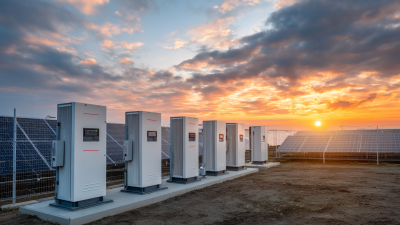Exploring the Advantages of Lifepo4 Battery Technology for Sustainable Energy Solutions
Table of Contents
- Advantages of Lifepo4 Battery Technology in Sustainable Energy Applications
- Comparative Analysis of Lifepo4 vs. Traditional Battery Technologies
- Key Performance Metrics of Lifepo4 Batteries in Renewable Energy Systems
- Lifepo4 Battery Lifespan and Environmental Impact Metrics
- Market Trends: Adoption Rates of Lifepo4 Batteries in the Energy Sector
- Economic Benefits of Lifepo4 Technology for Energy Storage Solutions
- FAQS
- Conclusion
- Related Posts
The increasing demand for sustainable energy solutions has led to a significant interest in advanced battery technologies, with the Lifepo4 Battery standing out due to its numerous advantages. As noted by a recent market analysis from Research and Markets, the global lithium battery market is projected to grow at a CAGR of 17.5% from 2021 to 2028, driven primarily by the rising adoption of energy storage systems. Roofer Electronics Technology (Shanwei) Co., Ltd., with over 27 years of expertise in R&D and manufacturing of lithium batteries, has contributed significantly to this growth. Lifepo4 Battery technology, known for its safety, longevity, and efficiency, has found applications in various sectors, including household energy storage, electric vehicles, and renewable energy integration.

As the world shifts towards greener energy solutions, Lifepo4 Batteries are positioned to play a crucial role in enhancing energy sustainability and reliability.
Advantages of Lifepo4 Battery Technology in Sustainable Energy Applications
Lithium Iron Phosphate (LiFePO4) battery technology has emerged as a pivotal player in sustainable energy applications due to its unique advantages. One of the most significant benefits is its enhanced safety profile. Unlike conventional lithium-ion batteries, LiFePO4 batteries are less prone to overheating and thermal runaway, making them an ideal choice for various applications where safety is paramount. Their stable chemistry not only improves safety but also extends the life cycle of the battery, allowing for consistent performance over many charge and discharge cycles.
Furthermore, the sustainable aspects of LiFePO4 technology cannot be overlooked. These batteries feature a lower environmental impact compared to other lithium-ion counterparts, as they do not contain toxic heavy metals like cobalt or nickel. This makes them more eco-friendly and easier to recycle. The longevity and durability of LiFePO4 batteries contribute to reduced waste and lower life-cycle costs, further enhancing their sustainability credentials. As industries and consumers increasingly prioritize eco-conscious choices, LiFePO4 technology stands out as a reliable solution for energy storage in solar power systems, electric vehicles, and other renewable energy projects.
Comparative Analysis of Lifepo4 vs. Traditional Battery Technologies
Lithium Iron Phosphate (LiFePO4) batteries have emerged as a viable alternative to traditional battery technologies, particularly in the context of sustainability and efficiency. Compared to conventional lead-acid batteries, LiFePO4 batteries exhibit superior performance in terms of energy density, cycle life, and thermal stability. This is essential for applications such as grid energy storage and electric transportation, where reliability and long-term performance are critical. Studies highlight significant environmental benefits when switching from lead-acid to lithium technologies, as the lifecycle emissions of LiFePO4 batteries are considerably lower, making them a more sustainable option.
Beyond eco-friendliness, a comparative analysis also reveals the economic advantages of LiFePO4 batteries. With advancements in recycling technologies and regulatory frameworks, the end-of-life management of these batteries is becoming increasingly efficient. Innovations in battery design contribute to better recycling efficiency, thus further reducing environmental impacts. Moreover, as industries prioritize sustainability, the cost savings associated with reduced energy consumption and maintenance underscore the viability of LiFePO4 batteries as a leading choice for future energy solutions.
Exploring the Advantages of Lifepo4 Battery Technology vs. Traditional Battery Technologies
This chart compares the key performance metrics of Lifepo4 battery technology against traditional battery technologies such as lead-acid and nickel-cadmium. The data reflects various attributes including energy density, cycle life, charging time, and environmental impact.
Key Performance Metrics of Lifepo4 Batteries in Renewable Energy Systems
Lithium Iron Phosphate (LiFePO4) batteries have emerged as a compelling choice in renewable energy systems due to their impressive performance metrics. With a cycle life of over 2000 cycles at 80% depth of discharge, these batteries provide longevity that significantly reduces the need for frequent replacements, leading to lower lifecycle costs. According to a report by the International Renewable Energy Agency (IRENA), the average lifespan of LiFePO4 batteries is approximately twice that of traditional lithium-ion batteries, making them ideal for applications requiring sustained energy output, such as solar energy storage.
In terms of safety, LiFePO4 batteries exhibit remarkable stability, operating within a temperature range from -20°C to 60°C without significant degradation, as highlighted by Battery University. Their low flammability and enhanced thermal stability not only address safety concerns but also ensure consistent performance under varying environmental conditions. Furthermore, LiFePO4 batteries maintain a discharge efficiency of over 90%, as noted by the U.S. Department of Energy, providing reliable energy efficiency for renewable systems. This combination of performance metrics underlines the significant advantages of LiFePO4 technology in advancing sustainable energy solutions.

Lifepo4 Battery Lifespan and Environmental Impact Metrics
Lithium Iron Phosphate (LiFePo4) batteries have garnered attention for their impressive lifespan and minimal environmental impact. Unlike traditional lithium-ion batteries, which can degrade significantly after just 500 charge cycles, LiFePo4 batteries boast a lifespan of up to 2,000 cycles or more, according to a report by the Battery University. This extended lifespan translates into lower costs over time and a reduced need for battery replacements, which is crucial for sustainability in energy solutions.
Moreover, the environmental impact metrics of LiFePo4 technology are favorable compared to other battery chemistries. A study by the International Energy Agency reports that LiFePo4 batteries are less prone to toxic material emissions and are more easily recyclable, thus minimizing landfill contributions. The absence of cobalt—a mineral often associated with harmful mining practices—in LiFePo4 formulations makes these batteries not only safer for the environment but also less volatile during operation. The increasing adoption of LiFePo4 batteries in electric vehicles and renewable energy storage systems underlines their significance in advancing sustainable technology while contributing positively to ecological preservation.
Market Trends: Adoption Rates of Lifepo4 Batteries in the Energy Sector
The adoption rates of LiFePO4 battery technology in the energy sector have been steadily increasing, driven by the growing demand for sustainable energy solutions. As industries seek efficient and reliable energy storage systems, LiFePO4 batteries stand out due to their safety, longevity, and thermal stability. Recent market research indicates that these batteries are being increasingly integrated into renewable energy projects, particularly in solar and wind applications, where they not only store excess energy but also help in smoothing out supply fluctuations.
Additionally, advancements in manufacturing processes and economies of scale are contributing to a noticeable reduction in costs, making LiFePO4 batteries a more attractive option for both commercial and residential users. This trend underscores a broader shift towards electrification and green energy, as governments and businesses push for reduced carbon footprints. The growing infrastructure supporting the use of LiFePO4 batteries, such as charging stations and grid integration technologies, further reinforces their position in the energy market, marking them as a key player in the transition towards more sustainable energy solutions.
Exploring the Advantages of Lifepo4 Battery Technology for Sustainable Energy Solutions - Market Trends: Adoption Rates of Lifepo4 Batteries in the Energy Sector
| Year | Adoption Rate (%) | Key Applications | Market Share (%) |
|---|---|---|---|
| 2019 | 15 | Electric Vehicles, Renewable Energy Storage | 10 |
| 2020 | 25 | Electric Vehicles, Backup Power Systems | 15 |
| 2021 | 35 | Solar Energy Storage, Off-Grid Solutions | 20 |
| 2022 | 45 | Grid Energy Storage, UPS Systems | 30 |
| 2023 | 60 | Grid Integration, Smart Grids | 40 |
Economic Benefits of Lifepo4 Technology for Energy Storage Solutions
Lifepo4 battery technology offers significant economic advantages for energy storage solutions, making it a prime candidate for sustainable energy applications. One of the most notable benefits is its long lifecycle, which can reach up to 10 years or more. This longevity reduces the need for frequent replacements, ultimately lowering the overall cost of investment for consumers and businesses alike. Additionally, Lifepo4 batteries exhibit lower susceptibility to thermal runaway compared to traditional lithium-ion batteries, thereby reducing the risk associated with catastrophic failures. This safety aspect not only protects investments but also enhances consumer confidence in adopting this technology.

Moreover, Lifepo4 batteries boast higher energy density and efficiency, allowing for better performance with a smaller footprint. This characteristic is especially beneficial for industries needing compact and efficient energy solutions, such as electric vehicles and renewable energy storage. The decreasing costs of production and increased adoption of Lifepo4 technology in various sectors further stimulate economic growth, as more jobs are created in research, manufacturing, and deployment. The overall cost-effectiveness, safety, and efficiency of Lifepo4 technology make it an economically sound choice for energy storage, driving the transition toward sustainable energy practices.
FAQS
: LiFePO4 batteries offer superior energy density, cycle life, and thermal stability, making them more reliable for applications like grid energy storage and electric transportation.
LiFePO4 batteries can last over 2000 cycles at 80% depth of discharge, which is approximately twice the lifespan of traditional lithium-ion batteries.
LiFePO4 batteries have lower lifecycle emissions, are less prone to toxic material emissions, and can be recycled more efficiently, reducing their environmental impact.
Their long lifespan and low maintenance needs result in lower lifecycle costs, while advancements in recycling technologies enhance their overall sustainability.
LiFePO4 batteries exhibit remarkable stability, operate safely within a temperature range of -20°C to 60°C, and have low flammability, minimizing safety concerns.
LiFePO4 batteries maintain a discharge efficiency of over 90%, providing reliable energy efficiency for various applications.
They lack cobalt, which is harmful to the environment, and are made with materials that are safer and less volatile, making them a more sustainable choice.
Their economic advantages include cost savings from reduced energy consumption and maintenance, making them a viable choice for future energy solutions.
They are ideal for applications requiring sustained energy output, such as solar energy storage, due to their impressive performance metrics.
With advancements in recycling technologies and regulatory frameworks, the end-of-life management of these batteries is becoming more efficient, further minimizing their environmental impact.
Conclusion
The article "Exploring the Advantages of Lifepo4 Battery Technology for Sustainable Energy Solutions" delves into the unique benefits that Lifepo4 batteries bring to the table in the realm of sustainable energy applications. By comparing Lifepo4 with traditional battery technologies, it highlights superior safety, longer lifespan, and efficiency, making it an ideal choice for renewable energy systems. Key performance metrics indicate that Lifepo4 batteries not only excel in energy density and discharge rates but also contribute positively to environmental impact considerations.
Additionally, the article examines current market trends, showcasing the increasing adoption rates of Lifepo4 batteries within the energy sector, which is further supported by Roofer Electronics Technology's extensive experience in lithium battery manufacturing and solutions. Economic benefits, such as cost-effectiveness and reduced reliance on lead-acid batteries, position Lifepo4 technology as a sustainable and economically viable solution for energy storage across various applications, from household energy systems to electric vehicles.
Related Posts
-

Exploring Lifep04 Batteries: A Comprehensive Comparison of Performance and Efficiency
-

Top Strategies for Maximizing Efficiency with Lithium Iron Phosphate Lifepo4 Batteries
-

Why Lithium Iron Phosphate Batteries Stand Out Among Other Battery Technologies
-

How to Optimize the Performance of Your 51.2v Lifepo4 Battery
-

Ultimate Guide to Choosing the Right Solar Lithium Battery for Your Energy Needs
-

Exploring Industry Trends for "Generator Solar Portable" at the 138th Canton Fair 2025 in China





 business@roofer.cn
business@roofer.cn +86 13502883088
+86 13502883088






